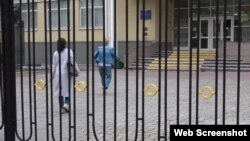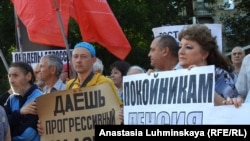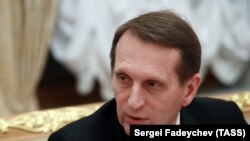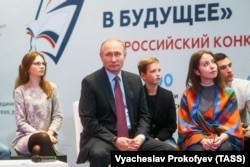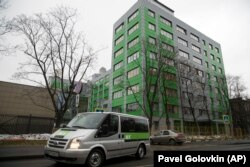A recent report that the news director of RT America, Mikhail Solodovnikov, plagiarized portions of his PhD dissertation should come as no surprise: dissembling your way to power power rather than speaking truth to it is an integral part of Putin’s Russia.
“Students cheat when they are cheated,” Igor Chirikov, senior research fellow at the Moscow-based Higher School of Economics’ Institute of Education, once told Times Higher Education.
And with the country’s leader, President Vladimir Putin, allegedly skimming anywhere from $40 billion to $200 billion off the top and then demanding the tail pay for it through crumbling infrastructure and pension reforms, many Russian’s might well feel cheated.
Education is the main institution where most Russian children first engage with the state.
In the city of Orenburg, students received notebooks with a portrait of the mayor and wise words on becoming a "spiritually rich individual."
The only problem: the mayor had recently been arrested on corruption charges.
As one social media user ironically posted: "Papa, who is that man on my notebook?" "That, my son, is [Mayor] Arapov. He will teach you everything that he knows and can do himself."
Perhaps few school children get such an early illustration of irony.
But such lessons can last a lifetime.
As trauma specialist Marilyn Murray wrote: “Russia is plagued by lying that ranges from what is deemed as a mild-mannered vranyo (white lies, tall tales) to immoral corruption.”
Sadly, this rampant dissembling and the crookedness it begets often sounds with the school bell.
According to a 2013 Transparency International Report, almost three-quarters of people in Russia see their educational system as "corrupt or highly corrupt," the BBC reported.
As Vladimir Rimsky wrote for the Institute of Modern Russia:
“One of the consequences of corruption in the Russian education system is that teenagers and students learn to solve their problems through corrupt means, a habit that carries over to other areas of their lives.”
Russia, incidentally, ranked 135th of 176 countries in Transparency International’s 2017 Corruption Perception Index.
It should thus come as no surprise that a 2012 Perception of Corruption report found that more than 83% of first year university students had “heard about” instances of bribery.
Speaking to the cynicism of modern Russia, the researchers themselves attributed the drop in final year students bearing witness to bribery (50%) to “the fact that young people are more naive and/or more willing to talk honestly about this phenomenon.”
Or, as Diana Bruk, recounting her experiences with rampant cheating as an English teacher in Russia, wrote for Esquire: “Cheating is a national sport and a source of pride, because in a country that is so thoroughly and wantonly corrupt, rigging the game to your advantage is the only skill that really matters.”
Her bleak comment came in response to a 2016 expose in Slate magazine, which outlined the black market for plagiarized dissertations in Russia.
It turns out one in nine members of the Russian State Duma received diplomas which had clearly plagiarized others works, Slate reported, citing Dissernet, a Russian NGO which vets the educational bona fides of Russian officials.
And, as it turns out, former Duma and United Russia party head Sergey Naryshkin, was among 53 MPs whose work showed signs of cribbing.
A raft of other officials, including the minister of culture, the governor of St. Petersburg, and the head of Russia’s Investigative Committee, have similarly been accused of illegitimately acquiring Ivory Tower laurels.
But, as Russians say, the fish rots from the head. And as big a fish as Naryshkin et al. may be, the biggest cheat was allegedly Russian President Vladimir Putin himself.
Igor Danchenko and Clifford Gaddy of the Brookings Institution in 2005 discovered that the thesis for Putin’s post-graduate degree had “heavily borrowed” from a 1978 textbook written by two American academics.
Olga Litvinenko, the daughter of "the richest rector in Russia," claims it was actually her father who originally wrote the president’s plagiarized dissertation.
"There was a great demand at the time – everyone wanted a candidate's or doctoral degree,” she told Radio Free Europe. “They produced dissertations for highly placed people on the basis of plagiarism."
So the “academic” hired to write a dissertation for a then rising political star plagiarized other academics, receiving the state’s largess for his troubles.
That is inception-level cheating; a nesting doll of fraud.
And yet the consequences of these revelations: nothing.
As Dissernet’s Sergei Parkhomenko bemoaned:
“The Russian public says, ‘So what? So he stole. Everyone steals. In the end, why would someone be a boss, if he is not stealing?’ So reputation means nothing. The threat—we will ruin your reputation, we will tell everyone you stole—does not produce any effect.’”
In the end, RT’s Solodovnikov might be a guppy in the shark tank of Russian officialdom.
But that the head of Russia’s state propaganda effort in America was potentially more concerned with the facade of higher education than the foundation should come as no surprise.
RT itself generously borrows from Western media outlets to then repackage the stories with its own editorial line.
For a station lauding “5 billion views on YouTube,” potentially the most popular video, “'Golden Voice' homeless man finds job, home after viral video success,” was originally uploaded by AP.
RT ultimately garnered 14 times the views of AP for that video. Talk about borrowing generously.
RT has been accused of overstating its viewership figures and padding its social media presence to push borrowed, poorly sourced or outright faked stories.
As political scientist Yascha Mounk said during an appearance on the channel, RT has served as a “key element” in divorcing politics from facts through the spread of propaganda, fake news and attempts to portray “a completely alternative version of reality.”
Mounk’s characterization of RT’s mission in the world is a dark one.
But if correct, the greatest irony may be: those seeking to undermine western institutions through the spread of disinformation themselves left truth to die in the schoolhouse.
(Editor's Note: Reporter William Echols, the author of this analysis, worked for RT from 2011 to 2015).




